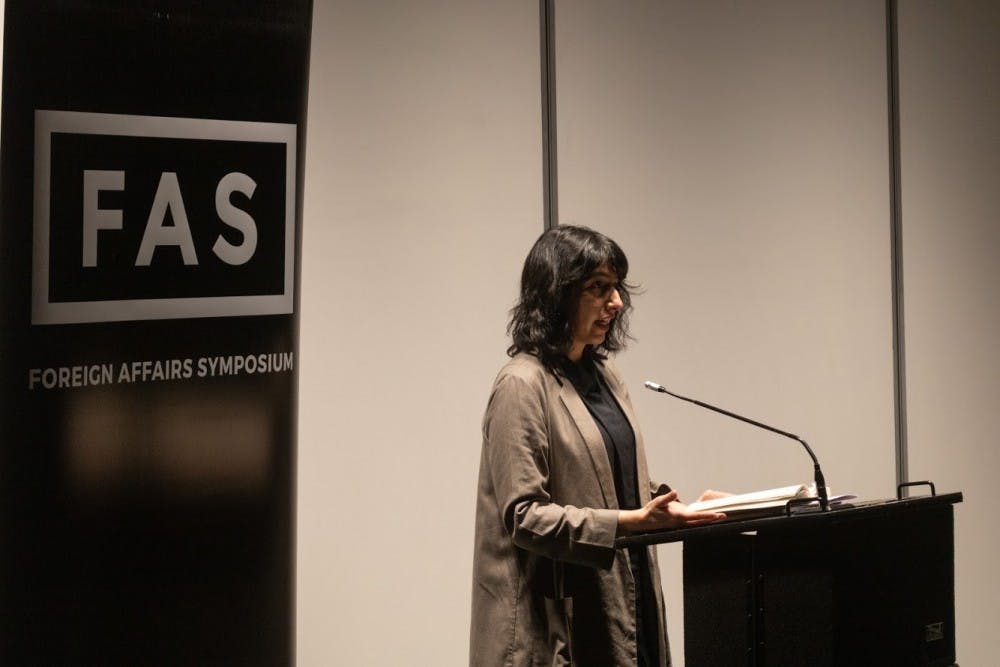Poet Solmaz Sharif spoke about the roles and responsibilities of modern-day political poets as a part of the Foreign Affairs Symposium (FAS) on Monday, Feb. 25. Sharif, a Turkish-born Iranian-American writer and lecturer at Stanford, read from her book Look. The collection of poems details the repercussions of war and exile. The Alexander Grass Humanities Institute co-sponsored Monday’s event.
According to FAS organizers, for 2019 they are focusing on bringing grassroots activists to campus.
During her talk, Sharif emphasized the importance of being “a poet against empire.” She believes that this idea is evident in her book, which juxtaposes the human effects of U.S. deployment in Iraq and Afghanistan with entries from the Department of Defense Dictionary of Military and Associated Terms.
Her goal as a poet, Sharif said, is to tell what is happening in the world, exactly as it is. She explained that some poets use language to beautify certain aspects of life — Sharif believes that writers should not do this.
“As a poet talking about foreign policy... what I point to is toenail clippings. Some poets might say they are like crescent slivers of moon. I loved that at first. The writers that would take dimples and turn them into parentheses and a smile into a secret. The writers that could make beautiful,” Sharif said. “But I believe the role of the poet, the poet against empire, is to say just what is. Toenail clippings.”
Sharif emphasized that it was difficult for her to get her book published and recalled taking her manuscript from publisher to publisher with no success for five years. She believes that one reason she had difficulty finding a publisher was a cultural resistance to political writing at the time. Although, Sharif explained, she does not see her writing as “political,” she believes that today’s world is much more open to this kind of work.
Sharif read a few selections from Look, including a poem titled “Drone” and one titled “Personal Effects,” an elegy for her uncle, who was conscripted and died in the Iran-Iraq War.
Sharif emphasized that her work is neither strictly autobiographical nor historical.
“What’s important for me is to distance these poems from autobiography,” Sharif said. “I am invested in the particular and actual lives, as they are impacted, and the names that are associated with them, but I am interested in this in terms of how much larger than the particular they actually are, and how they reveal that the borders between self and other, between now and then, here and there, are actually far more porous and difficult to locate than we tend to think.”
Sharif then told the story of a minor rebellion in an Iranian prison that she once read about. It was then the regular practice in that prison, she said, to have one of the captured counterrevolutionary leaders go before the newly processed prisoners and recant his political beliefs. Sharif was inspired by the story of a young woman standing up to rebuke one of these recanting leaders.
Sharif read one of her poems, “Persistence of Vision: Televised Confession,” which pivots around this story.
She went on to address the role of poetry in today’s political landscape.
“The poem should be instead the beginning of the conversation for the real work that needs desperately to be done,” she said.
The talk then opened into a Q&A session. Afterward, sophomore Anishta Khan said in an interview with The News-Letter that she enjoyed the event. Khan chose to attend because she was familiar with Sharif’s work.
“I appreciate how critically she thought of poetry,” she said. “She coined this term, ‘poet of the empire’, which I personally thought was a very interesting way to phrase the responsibility of poets.”
Sophomore Kelechi Nwankwoala was also glad he had come to see Sharif. He appreciated Sharif’s message that everyone is an active participant in history.
“We all have a much greater effect on what actually is going to become history than maybe we choose to acknowledge. And her pointing that out, to me, is a great way of empowering people,” he said.





